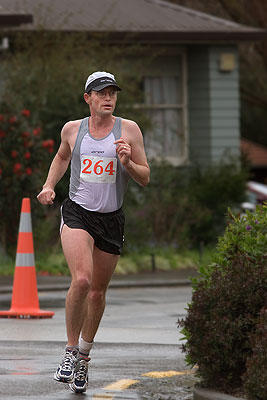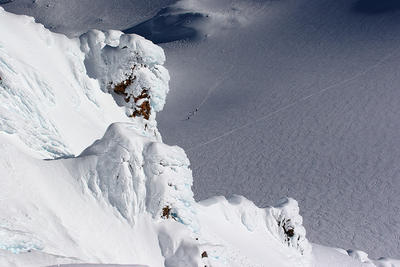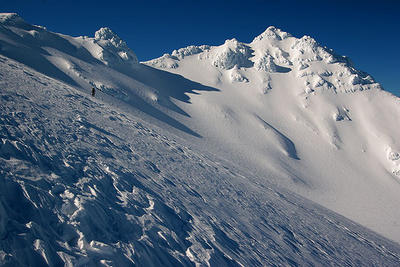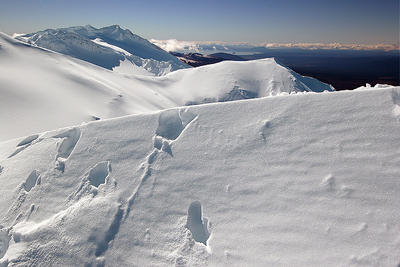 I realise the headache is back—that little guy tugging at a fistful of nerves above and behind my right eye is at it again. Bugger. I turn over, looking for respite. A starling scrabbles on the guttering and begins to click and gurgle; something's clambering about in the woodshed, knocking over blocks. Probably one of the cats looking for a late rat or heading next door, hoping for breakfast. The homunculus in my head hasn't given up; instead, he's swinging from that bunch of nerves, so I decide to try poisoning him with nurofen. I struggle upright and swallow two; switch the radio on and listen to Morning Report. It's the same stuff: the results of the latest political poll; a report that New Orleans is being evacuated; unsurprising revelations about the role of the Business Round Table in Don Brash's career as National Party leader; and confrontational interviews.
I realise the headache is back—that little guy tugging at a fistful of nerves above and behind my right eye is at it again. Bugger. I turn over, looking for respite. A starling scrabbles on the guttering and begins to click and gurgle; something's clambering about in the woodshed, knocking over blocks. Probably one of the cats looking for a late rat or heading next door, hoping for breakfast. The homunculus in my head hasn't given up; instead, he's swinging from that bunch of nerves, so I decide to try poisoning him with nurofen. I struggle upright and swallow two; switch the radio on and listen to Morning Report. It's the same stuff: the results of the latest political poll; a report that New Orleans is being evacuated; unsurprising revelations about the role of the Business Round Table in Don Brash's career as National Party leader; and confrontational interviews. It's the interviews that get me thinking. As I half-listen to Sean Plunkett question Roger Douglas, I recall the Guardian article Ann drew my attention to: Martin Kettle writing about talking, and the art of it. Kettle's article was prompted by the death of British politician Robin Cook—someone I knew nothing about—and is a call for a more mature and considered approach to conversation. Implicit in his essay is the argument that you can't have a good, constructive conversation without a degree of humility. In the words of Robert Louis Stevenson, considered by Kettle as a paragon of conversation,
“we must be prepared to "lay ourselves open", to be prepared to listen as well as to speak, to acknowledge that we do not know the answers before we pose the questions.”
This is about as far from most political debate as Bush is from Einstein. Here's Kettle again:
“Politicians, indeed, are now trained specifically not to answer interviewers' questions. Instead they are told to remain focused on making the predetermined points in the party "line to take". Their interrogators are no better, seeking little more than to hector, embarrass and oversimplify. The consensual creativity and freedom of true talkers, trusting and trusted, is wholly absent, almost wholly subordinated to egotism, adversarialism and melodrama.”
The words are from a UK context, but they're as apt for Aotearoa as anything I've heard. How often have you heard a politician answer a question with the words, “First, let me just say...”? Listen for it—you won't have to wait long.
I wish it weren't true. We're missing out on so much. Imagine what it would be like if MPs listened to each other with the intention, not of looking for ways to attack the opposing argument, but of learning and of seeking improved solutions. Or even if they just listened.
One of the great joys of my life (and there are many) is talking with friends: in particular, talking about interesting and significant topics. You could—perhaps disparagingly—call it pub philosophy and I'd have to admit an element of truth in that—but only because it often happens in the Celtic. But it's just as likely to happen over a kitchen table; in someone's lounge; on a long car journey or in a cafe. It's pub philosophy only in the sense that we often don't know what we're talking about—and that's what so often makes it so worthwhile. When you don't know much about something, you wonder more about it. You're more likely to explore possibilities rather than attacking or defending a position; you learn things.
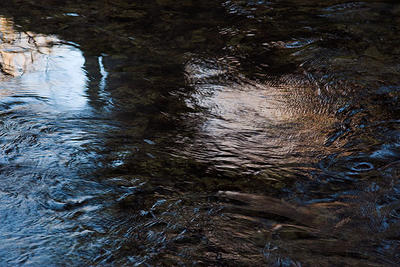 Sometimes, of course, one of the others does know something about the topic. Sometimes a great deal about it. I'm lucky enough to have friends whose general (and specialised) knowledge is nearly encyclopaedic—the only problem is that sometimes the owner has lost the index. You learn a huge amount from conversations with people like that: but only if you're prepared to listen and think.
Sometimes, of course, one of the others does know something about the topic. Sometimes a great deal about it. I'm lucky enough to have friends whose general (and specialised) knowledge is nearly encyclopaedic—the only problem is that sometimes the owner has lost the index. You learn a huge amount from conversations with people like that: but only if you're prepared to listen and think.
So it's only pub philosophy in a partial sense. I'm not talking about arguments over the cricket or the rugby, although there's a place for that. I'm talking about conversations where you leave with the knowledge that you've just engaged in “harmonious speech”; the sort of activity that “completes our education ... [and] founds and fosters our friendships”.
I switch the radio off. The bright note has been confirmation that we weren't alone in responding so positively to the new All Blacks' haka—apparently the acclaim has been ubiquitous. Kapa o pango was written by Derek Lardelli (Ngati Porou) and the AB's have been working on it for the last year. It's many things—spine-tingling and fiery are words that immediately spring to mind—but one of the most significant is that it recognises and revels in the cultural diversity that adds so much to New Zealand society. I'm looking forward to getting back among that diversity; I'm anticipating the joy of sitting down with friends from all over the world and enjoying the art of talking.
[The top photo is from my time at French Pass in the Marlborough Sounds a few months ago. Looking towards Clayface Point and out into Admiralty Bay. The lower photo is Te Awaoteatua Stream, which flows out from the southern Ruahine Range and passes close by my place; I took the photo yesterday evening.]
Photos and words copyright 2005 Pete McGregor

